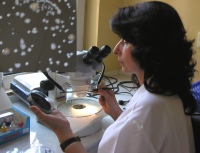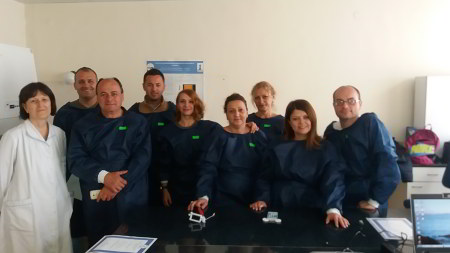Department of Microbiology (8)
NRL for Control and Monitoring of Antimicrobial Resistance
National Reference Laboratory “Control and Monitoring of Antimicrobial Resistance” (NRL „CMAR”)
Contacts:
Head of the NRL-CMAR:
Assoc. Prof. Ivan Ivanov, PhD- Microbiology specialist
| tel.: | + 359 2 944 69 99, ext. 312 |
| + 359 2 944 69 99, ext. 208 | |
| e-mail: | This email address is being protected from spambots. You need JavaScript enabled to view it. |
| This email address is being protected from spambots. You need JavaScript enabled to view it. |
Laboratory staff:
Assistant Professor Elina Dobreva, PhD- Microbiology specialist
Assistant Professor Rumyana Hristova, PhD
Assistant Professor Martyn Nedyalkov, MD, PhD- spesializing Microbiology
Assistant Professor Krasimira Ivanova, PhD- specializing Microbiology
Veselin Dobrinov- biologist
Radka Krumova- senior laboratory technician
Reni Simeonova- sanitation worker
National Reference Laboratory “Control and Monitoring of Antimicrobial Resistance” is ISO 17025 certified and is also certified for its regular participation in the External Quality Assurance Scheme - “INSTAND” Germany.
1. National Reference Laboratory “Control and Monitoring of Antimicrobial Resistance” is the national reference laboratory responsible for the detection and investigation of antibiotic resistance. NRL “CMAR” studies and investigates all aspects of antibiotic resistance, in particular confirmation, interpretation and also molecular investigation of new or unusual resistance traits. The laboratory collects and tests referred isolates, principally those considered to have unusual resistance. NRL “CMAR” performs Disk Diffusion Method for Antimicrobial susceptibility testing and if necessary also Minimum inhibitory concentrations (MICs) of relevant antibiotics are determined. NRL “CMAR” advises on which agents may be appropriate for therapy and on any public health risk.
2. External Quality Assessment Scheme
National Reference Laboratory “Control and Monitoring of Antimicrobial Resistance”, together with the Bulgarian Association of Microbiologists (BAM), conducts the External Quality Assessment Scheme for microbiology laboratories in Bulgaria.
3. NRL “CMAR” also administrates Bulgarian Surveillance Tracking of Antimicrobial Resistance (BulSTAR).
The Department of Microbiology in NCIPD, in coordination and cooperation with the Bulgarian Association of Microbiologists (BAM) collects and analyzes annual routine susceptibility test data reports from almost all state microbiology laboratories of the public health facilities, and a significant number of private microbiology laboratories throughout the country. The reports include all clinically significant microorganisms, isolated in the collaborating centers, and their sensitivity to more than 50 antimicrobial agents, tested routinely in the participating laboratories using a nationally adopted standardized method and an element of a rule-based result checking, applied before the data have been accepted and proceeded for analysis.
Currently BulSTAR is a national network of 166 microbiology laboratories – 13 public laboratories, 82 hospital ones, and 71 private laboratories, covering practically in 2013 the whole population in all the regions and counties of Bulgaria. A small working group in NRL “CMAR” organizes and conducts the surveillance process. Each year “CMAR” laboratory summarizes the results in annual reports, the latter being sent back to the collaborating centers and made available to the public on the Internet site of BAM (www.bam-bg.net).
4. Educational courses
NRL “CMAR” conducts a specialized educational course for graduated medical doctors, biologists and laboratory technicians on the issues of mechanisms and surveillance of antimicrobial resistance.
5. Specialized studies
NRL “CMAR” also undertakes commissioned studies to evaluate the in-vitro activity of novel antibacterial agents against tailored panels of bacteria, consisting of characterised strains with defined resistance mechanisms, and recent multi-resistant clinical isolates. As an ISO 17025 certified laboratory NRL “CMAR” participates and offers collaboration upon national and international projects and programs in the field of medical microbiology, surveillance of antimicrobial resistance and antibiotic consumption.
6. Microbiological testing with determination of antimicrobial susceptibility (antibiogram)
NRL “CMAR” has proven authority in Bulgaria and worldwide. We offer the possibility for microbiological testing with determination of antimicrobial susceptibility (antibiogram) of the most important human pathogens. The laboratory is equipped with the latest appliances and apparatuses for modern diagnostics and antimicrobial susceptibility testing, including rapid-diagnostic equipment: VITEK “bioMerieux”, Micronaut “Merlin” etc. Among the diagnosed materials and samples are: uroculture (urine samples), vaginal and cervical swabs, prostate secretes, urethral swabs, throat, nasal, eye and ear secretes, sputum, wound secretes, etc.
Patients can receive expert medical opinion regarding their condition and course of treatment.
Sector "Nosocomial infections"
- Participates in the process of development and implementation of the Medical standard for prevention and control of nosocomial infections.
- Develops, proposes for approval by the Minister of Health and participates in the implementation of the National Programme for Prevention and Control of nosocomial infections and the spread of antimicrobial resistance / AMR /.
- Participates in the annual evaluation of data from the national epidemiological surveillance of nosocomial infections and in representing Bulgaria to the European Surveillance Network of nosocomial infections.
- Counsels and assists the orderly conduct of studies on nosocomial infections at national and regional level and in individual hospitals.
- Participates in the coordination of the microbiological confirmation by reference methods of nosocomial agents with growing epidemic relevance and involved in outbreaks. Molecular genetic methods are developed and implemented to identify and characterize mechanisms of resistance to antimicrobials (ESBL, carbapenemases, etc.).
- Contemporary diagnostic genetic tests for identification of Clostridium difficile and toxin determination are performed in NRL-CMAR directly in clinical material (stool sample) of outpatient and hospitalized patients. Various of PCRs, running in real time (real time PCR) with high sensitivity and specificity are applied.
- C. difficile is isolated and confirmed by phenotypic and genetic methods. The cultured strains with high epidemic potential can be characterized by adopted standard European molecular methods (PCR-ribotyping and Multilocus variable number tandem reapeat analysis, MLVA7) for investigation of genetic relatedness and hospital outbreaks.
- Develops standard protocols for epidemiological typing of indicator bacterial species by molecular genetic methods: ESBL-producing members of the family Enterobacteriaceae, multi-resistant Pseudomonas aeruginosa and Acinetobacter baumannii, carbapenem-resistant Enterobacteriaceae and others.
- Proposes and assists in various training programs on antibiotic resistance and the control of nosocomial infections together with medical and non-medical universities.
- Participates in conducting of various training courses as well as postgraduate programs for medical doctors, biologists, health care professionals and other personnel working in hospital settings.
NRL of Tuberculosis
National Reference TB Laboratory (NRL TB)
Head of NRL TB: Assistant Professor Yuliana Atanasova, PhD
Address: 44A, Stoletov Blvd
1233 Sofia
Bulgaria
Tel.: +359 2 944 64 45
e-mail: This email address is being protected from spambots. You need JavaScript enabled to view it.
Staff of NRLTB:
Yuliana Atanasova, Assistant Professor, PhD
Stanislava Yordanova, Assistant Professor, PhD
Ana Baykova, biologist
GabrielaVasileva, laboratory worker
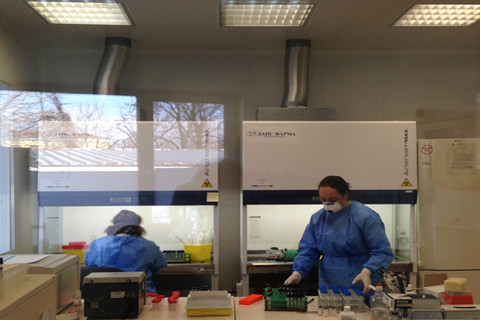
History of NRL TB
NRL TB was established in 2005 as a part of the Microbiological Department, NCIPD. The laboratory is ISO 17 025 certified and also certified for its regular participation in the TB External Quality Assurance Scheme of INSTAND e.V., Dusseldorf, Germany.
Main activities of NRL TB
Routine diagnosis of TB: using conventional and molecular methods – from sample accepting through smear microscopy and culture to strain isolation, species identification and drug susceptibility testing. The performed microbiological analysis are: smear microscopy – Ziehl-Neelsen; culture – solid medium: Löwenstein-Jensen and liquid medium, BACTEC MGIT 960 System; DST FLD – liquid medium, BACTEC MGIT 960 System; DST SLD – liquid medium, BACTEC MGIT 960 System; LPA – Geno Type, BRUKER: MTBDRplus, MTBDRsl, CM, AS, MTBC.
Reference activity: confirmation of resistant tuberculosis strains and species identification of Nontuberculous Mycobacteria strains (NTM) from all over the country. Twice a year NRL TB prepares panel testing for national TB network and performs EQA TB scheme for smear microscopy, culture and DST, according to Bulgarian Microbiological Standard.
Training courses: yearly 5 days training for biologists, doctors and lab technicians on microbiological diagnosis of TB and NTM.
Research: NRL TB participates in national and international scientific projects and programs as follows:
1. National TB program of Bulgaria, 2021-2025г.
2. Fundamental Translational and Clinical Investigations on Infections and Immunity.European Fund for regional development through OP Science and Education for Smart Growth 2014-2020, (Grant BG05M2OP001-1.002-0001-C04)
3. European Reference Laboratory for Tuberculosis – Net 2 (ERLTB-Net 2)
4. „Non tuberculous mycobacteria in caves’ biofilms and carst rivers in Bulgaria and the related infections.” National science fund, № КП- 06-М61/8/15.12.22
Publications:
- Atanasova Y, Baykova A, Bachiyska E, Yordanova S. Nontuberculous Mycobacteria - current risk in Bulgaria. Problems of infectious and parasitic diseases. Vol 51, 2, 2023, 19-24: DOI: https://doi.org/10.58395/gnmhxb78
- Bachiyska EV, Atanasova YA, Baykova AI, Yordanova SP (2022) Mycobacterium intracellulare among TB suspected patients in Bulgaria – microbiological aspects. Folia Medica 64(4): 661-666. https://doi.org/10.3897/folmed.64.e76901
- Yordanova S, Bachiyska E, Tagliani E, Baykova A, Atanasova Y, Spitaleri A, Cirillo DM (2022) Whole genome sequencing of Bulgarian rifampicin resistant Mycobacterium tuberculosis strains. Folia Medica 64(4): 633-640. https://doi.org/10.3897/folmed.64.e70554
- Guglielmetti L, Günther G, Leu C, et al. Rifapentine access in Europe: growing concerns over key tuberculosis treatment component. Eur Respir J 2022; 59: 2200388 [DOI: 10.1183/13993003.00388-2022].
- Gunar Günther, Lorenzo Guglielmetti, Claude Leu, Christoph Lange, Frank van Leth, TB net, Availability and costs of medicines for the treatment of tuberculosis in Europe, Clinical Microbiology and Infection, https://doi.org/10.1016/j.cmi.2022.07.026
- Cost and availability of drugs and treatment regimens and availability of drug resistance testing for tuberculosis in Europe. medRxiv 2022.02.15.22271006; doi: https://doi.org/10.1101/2022.02.15.22271006.
- Vladimir Milanov, Nikolay Yanev, Natalia Gabrovska, Denitsa Dimitrova, Elizabeta Bachiyska, Vania Youroukov, Current approaches to control of isoniazid-resistant tuberculosis, Probl Inf Dis, Vol 50, 2022, 1, 25-31
- Yordanova, A. Baykova, Y. Atanasova, Y. Todorova, E. Bachiyska. Isoniazid-monoresistant tuberculosis in Bulgaria. Probl. Inf. Parasit. Dis.,Vol. 48, 2020, 1,p. 21-24.
NRL of Molecular Biology

Chef Laboratory: Assoc. Prof. Viktoriya Levterova, PhD, This email address is being protected from spambots. You need JavaScript enabled to view it.
Conatacts: tel. 02/944 69 99 / int. 290, 353 /
Composition of the laboratory:
Chief Assist. Nadia Brankova, PhD
Chief Assistant Ivan Simeonovski, PhD
Magi Ivanova - biologist
Kristin Tankova - medical Assistant
Krassimira Vassileva - lab worker
History of the laboratory
This laboratory was found in 1972 by Prof. S. Todorov as a Radiational Microbiology Laboratory in the Department of Molecular and Cell Biology in the Institute. Its activity was linked to isotopic analysis of nucleic acids of microorganic origin; Molecular hybridization; Gradient analysis and more. Since 1992-2000 the laboratory has been renamed to the Laboratory of Radiational Microbiology and RNA Technologies and was led by Assoc. Prof. Dr. V. Zlatev. The main directions in the team's development were: study of serovar specific plasmids of salmonella strains; plasmid analysis of epidemic dysenteric strains; Genetics and metabolism of pertussis bacteria. Since 2000 the head of the Laboratory of Molecular and Radiation Microbiology was Assoc. Prof. Panayotov, PhD. The main directions of the laboratory activity are: routine diagnostics by PCR and RT-PCR test for B. pertussis, atypical pneumonia acquired by C. pneumoniae, M. pneumoniae, chlamydial infections (C. trachomatis) , Development of molecular-epidemiological methods - Random Amplification of Polymorphic DNA (RAPD), Amplified fragment length polymorphism (AFLP).
From 2012 the laboratory developed and introduced diagnostics for bacterial meningitis by conventional PCR and RealTime PCR for N. meningitidis, S. pneumoniae, H. influenzae. In 2013 and 2014 N. meningitidis typing by RealTimePCR was introduced and the typing of 16 S. pneumoniae serotypes/serogroups was applied by conventional PCR. In 2016 was implemented a typing of 6 serogroups for H. influenzae by RealTimePCR and we introduced diagnostics for Bordetella parapertussis by conventional PCR.
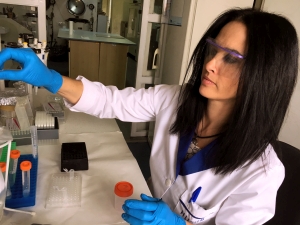
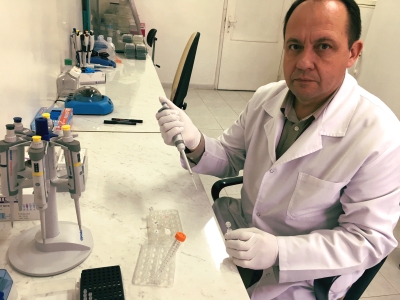
Diagnostic tests conducted in the laboratory
Every year, the quality of the laboratory's diagnostics work is controlled and certified by the Institute for Standardization and Documentation of Medical Laboratories
![]() , Düsseldorf, Germany.
, Düsseldorf, Germany.
- Test for pertussis (Bordetella pertussis)
Whooping cough, also known as pertussis is a vaccine-preventable, acute infectious disease of the respiratory tract caused by the gram-negative coccobacillus Bordetella pertussis. The infection is transmitted by airborne droplets. It affects all age groups, but the most vulnerable group of society are infants under one year of age, who are at the greatest risk of severe complications or even death.
Suitable materials for testing by PCR are nasopharyngeal and throat secretions.
- Test for parapertussis (Bordetella parapertussis)
Parapertussis is a highly contagious respiratory disease affecting all age groups of the population. The causative agent is the Gram-negative bacterium Bordetella parapertussis, which is related to Bordetella pertussis. Infants (under 6 months of age) may experience a more severe course of parapertussis infection. In them, as well as in patients of other age groups, it is possible to demonstrate a co-infection of pertussis with parapertussis.
Suitable materials for testing by PCR are nasopharyngeal and throat secretions.
- Chlamydia infection (Chlamydia trachomatis)
Chlamydial infection is caused by an intracellular bacterium called Chlamydia trachomatis. It is sexually transmitted and affects both men and women. Suitable materials for PCR testing for men are first morning urine or urethral secretion, and for women a cervical secretion taken by a gynecologist.
- A test for community acquired atypical pneumonia caused by Chlamydophila pneumoniae, Mycoplasma pneumoniae, Streptococcus pneumoniae and Haemophilus influenzae.
Chlamydophila pneumoniae, Mycoplasma pneumoniae, Streptococcus pneumoniae and Haemophilus influenzae cause atypical pneumonia. Infectious is reported to be transmitted by air-droplet route. Suitable materials for PCR testing are throat secretion, sputum or BAL (broncho-alveolar lavage)
- Test for Helicobacter pylori
Helicobacter pylori is a spiral gram-negative microorganism. Experts have found that it exists in the stomach of about 50% of the population. Much of the infected are without symptoms and do not suspect problems with gastrointestinal disorders - ulcers, GERD, gastric cancer.
Suitable materials for PCR testing are materials from biopsy.
- Bacterial meningitis (Neisseria meningitidis, Streptococcus pneumoniae and Haemophilus influenzae)
Many bacteria cause meningitis. Neisseria meningitides, Streptococcus pneumoniae and Haemophilus influenzae cause about 80% of the cases. Etiology depends on whether the infection is acquired in a hospital or is acquired in society, with the age and general condition of the patient being of particular importance. Infection with the causative agent is by air-dripping from sick or healthy bacterial carriers and cranial trauma. The classic symptoms of acute bacterial meningitis include fever, headache, general hyperaesthesia (light-headedness, intolerance to strong sounds and touch), meningitis, and disturbances in consciousness. Meningial symptoms are due to irritation of brain envelopes due to increased intracranial pressure caused by cerebral edema and malfunctions in the cerebral spinal fluid.
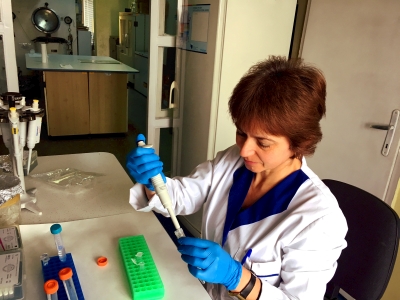
Laboratory activity
The laboratory has been accredited by the Bulgarian Accreditation Service (BAS) since 2003 according to the European requirements of the standard BNS ISO EN 17025 for high quality of work.
Since 1998, the quality of diagnostic work has been controlled and certified by the Institute of Standardization and Documentation of Medical Laboratories, ![]() , Düsseldorf, Germany.
, Düsseldorf, Germany.
Since 2006, the laboratory has organized National External Laboratory Control of Molecular Biological Diagnostics in Bulgaria by issuing certificates.
An annual course is included in the Specialization program including molecular diagnostics and typing of infectious agents.
Students, specialists and PhD students are trained in the laboratory.
The laboratory regularly publishes results of its work in specialized international and Bulgarian scientific journals and reports to national and international congresses.
PRICES
|
Analyzed microorganisms |
Type of analysis |
Price |
|
Bordetella pertussis |
RealTime PCR |
41 BGL |
|
Bordetella parapertussis |
RealTime PCR |
41 BGL |
|
Chlamydia trachomatis |
RealTime PCR |
41 BGL |
|
Helicobacter pylori |
PCR |
41 BGL |
|
Chlamydophila pneumoniae |
RealTime PCR |
41 BGL |
|
Mycoplasma pneumoniae |
RealTime PCR |
41 BGL |
|
Neisseria meningitidis |
RealTime PCR |
41 BGL |
|
Haemophilus influenzae |
RealTime PCR |
41 BGL |
|
Streptococcus pneumoniae |
RealTime PCR |
41 BGL |
|
Neisseria gonorrhoeae |
RealTime PCR |
41 BGL |
|
Mycoplasma genitalium |
RealTime PCR |
41 BGL |
|
Ureaplasma urealyticum |
RealTime PCR |
41 BGL |
|
Mycoplasma hominis |
RealTime PCR |
41 BGL |
|
Taking a throat or eye discharge |
4 BGL |
In the NRL "Molecular Microbiology" active research activities are carried out, and the most significant scientific topics in the last five years are:
1.1. FNI project: Molecular genetic identification and creation of an archival genome bank of circulating S. pneumoniae in children, as well as analysis of the prevalent serotypes associated with the introduction of pneumococcal vaccines in the Republic of Bulgaria.
1.2. Project: "Fundamental, translational and clinical research in the field of infections and infectious immunology" under the Operational Program "Science and Education for Intelligent Growth", NCZPB.
1.3. FNI project: "Molecular-genetic studies on the prevalence of pneumocystosis in people in Bulgaria".
1.4. FNI project: No. KP-06-DK 1/10 29.03. 2021 "Study of the interaction of specific structural proteins of SARS-CoV-2 with biologically active molecules and their application to create rapid antigen tests for early diagnosis of COVID-19", under "Competition for funding fundamental scientific research on societal challenges related to with the COVID-19 pandemic – 2020.”
The results of the laboratory's scientific activity over the past five years have been presented in the following publications in international and national refereed journals:
- Viktoriya Stefanova Levterova , Ivan Marinov Simeonovski, Nadia Boyanova Brankova, Magi Ventsislavova Ivanova, Ivva Ognianova Philipova and Mariya Rumenova Malcheva, “CARRIAGE AND DISTRIBUTION OF SEROTYPES STREPTOCOCCUS PNEUMONIAE IN HEALTHY VACCINATED CHILDREN FOR THE YEAR 2021 IN BULGARIA”, World Journal of Advanced Research and Reviews , 2022, 14(03), 511–516 Article DOI: 10.30574/wjarr.2022.14.3.0594, DOI:https://doi.org/10.30574/wjarr.2022.14.3.0594, IF:7,6
- Victoria Levterova, Ivan Simeonovski, Nadia Brankova, Todor Kantarjiev. Meningococcal meningitis – diagnosis and serotyping by molecular methods. Med Info, 2020, 3, 76-80
- Nadia Brankova, Victoria Levterova, Ivan Simeonovski, Maria Malcheva, Todor Kantarjiev. General analysis of the spread of pertussis infection in Bulgaria for a ten-year period (2009 - 2018) Pediatrics 2020, issue 3, 26-29 Q4
- Philipova I, Levterova V, Simeonovski I, Kantardjiev T. “Azithromycin treatment failure and macrolide resistance in Mycoplasma genitalium infections in Sofia, Bulgaria”, Folia Med Plovdiv, [in press] Impact factor: 0.378 Q4
http://www.proceedings.bas.bg/ddn/IF_Metrics.html, file:///C:/Users/MolecularLaptop/Downloads/FM_article_63624_en_1.pdf
- Ivva Philipova,Victoriya Levterova,Ivan Simeonovski,Todor Kantardjiev, High rate of fluoroquinolone resistant Neisseria gonorrhoeaedetected by molecular surveillance of antimicrobial resistance determinants in Bulgaria, Biotechnology & Biotechnological Equipment, Pages 942-948 | Received 04 Jul 2022, Accepted 07 Nov 2022, Published online: 17 Nov 2022, DOI: 1080/13102818.2022.2146532 Impact factor: 1.762
- Ivva Philipova, Viktoryia Levterova,Ivan Simeonovski, Todor Kantardjiev. Antimicrobial Resistance and Whole Genome Sequencing Analysis of Neisseria gonorrhoeae Isolates in Bulgaria, 2019, p.1579.BIOLOGY Microbiology, IF: 0,378
https://www.proceedings.bas.bg/index.php/cr
- Philipova I, Levterova V, Simeonovski I, Kantardjiev T. “Azithromycin treatment failure and macrolide resistance in Mycoplasma genitalium infections in Sofia, Bulgaria”, Folia Med Plovdiv, [in press] http://www.proceedings.bas.bg/ddn/IF_Metrics.html. IF:378
- Levterova, V., I. Simeonovski, N. Brankova, I. Filipova, M. Malcheva, T. Veselov Kantarjiev. Carriage and prevalence of Streptococcus pneumoniae serotypes in healthy children up to 6 years of age in Bulgaria after introduction of PCV10 in the national vaccination calendar, Pediatrics, VOLUME LXII, 3/2022 Q4
- Victoria Levterova, Ivan Simeonovski, Nadia Brankova, Magi Ivanova, Ivva Philipova, Mariya Malcheva , A CASE REPORT OF a child with recurrENT catarrh CO-COLONIZED with five STREPTOCOCCUS pneumoniae serotypes, PROBLEMS of infectious and parasitic diseases, August 11, 2022,ISSN: 0204-9155 (Print), SSN: 2815-2808 (Online) Q4
- Malcheva, I. Philipova, I. Simeonovski, V. Levterova, N. Brankova, T. Kantardjiev “Antimicrobial susceptibility of S. pneumoniae strains isolated from children with nasopharyngeal carriage”, Problems of Infectious and Parasitic Diseases 48(1):15-20, 2020 Q4
- Philipova, V. Levterova, I. Simeonovski, Z. Ivanova, L Boyanova, Kantardjiev “Prevalence of Neisseria gonorrhoeae and Mycoplasma genitalium in Bulgarian population from Sofia municipality of reproductive age, 2018-2019” Problems of Infectious and Parasitic Diseases 49(2):20-26, 2021 Q4
- Tomova, R. Nenova, N. Brankova, V. Levterova. Diagnosis of Legionnaires' disease in Bulgarian patients. In Spiro 2020, 55(4), 29-33
- Malcheva M., I. Simeonovski, V. Levterova, N. Brankova, I. Filipova, T. Kantarjiev. Genetic studies on carriage and prevalence of Streptococcus pneumoniae serotypes in children. 2019, no. 4, 43-45 Q4
- Tsvetkova, A. Ivanova, R. Harizanov, I. Rainova, N. Yancheva-Petrova, D. Strashimirov, R. Enikova, M. Videnova, E. Kaneva, I. Kaftandjiev, V. Levterova, I. Simeonovski, A Pilot Study of Drug Resistance in Pneumocystis Jirovecii Isolates from Bulgarian Patients with Pneumocystis Pneumonia, Conference Proceedings, Istanbul Turkey Jun 28-29, 2021, Part XIV
Written by Super User
National reference laboratory of vector-borne infections, listeria and leptospires
Head, National reference vector-borne infections, listeria and leptospires laboratory
Assist. Prof. Iva Trifonova, PhD
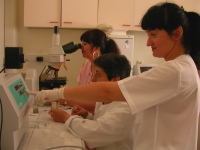 |
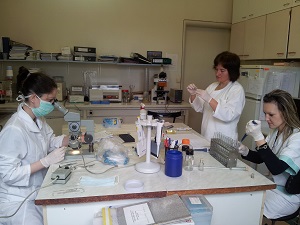 |
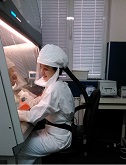 |
Staff:
Assist. Prof. Teodora Gladnishka, PhD
Assist. Prof. Elitsa Panayotova, PhD
Assist. Prof. Evgenia Taseva, PhD
Dr. Kim Ngoc
Vladislava Ivanova, biologist
Iva Vladimirova, biologist
Silvia Damyanova, laboratory worker
Tanya Drambozova, laboratory worker
National Reference Laboratory (NRL) of Vector-borne pathogens, listeria and leptospires was established in 2007 by combining NRL of leptospires, borelia and listeria and laboratory of arboviruses. NRL of borrelia, leptospires and listeria was founded in 1953 and recognized as the Reference laboratory for leptospirosis since 1960. From 1993 to 2021 the laboratory is headed by Prof. Iva Christova, M.D., Sci. This period is associated with conducting active research into the etiology, epidemiology and diagnosis of Lyme disease and viral haemorrhagic fevers.
The NRL performed routine and confirmatory diagnostics of mosquito-borne infections – West Nile virus, Dengue, Yellow fever, Chikungunya and Zika virus infections (PCR and serology), tick-borne infections - Crimean-Congo hemorrhagic fever (RT-PCR and serology), Tick-borne encephalitis (RT-PCR and serology) and Lyme disease (PCR and serology - routine diagnosis by ELISA and confirmatory by immunoblot) as well as diagnostics of hantavirus infections (hemorrhagic fever with renal syndrome), lymphocytic choriomeningitis, leptospirosis and listeriosis
The laboratory organizes and conducts a course on Etiology, epidemiology, clinic, diagnosis and treatment of Lyme disease and other bacterial and viral vector-transmitted infections; leptospirosis and listeriosis, as well as individual trainings of PhD students and specialists in microbiology.
NRL Tick/vector-borne infections annually passes two external international quality controls for the diagnostic activities of Lyme borreliosis and West Nile fever, conducted by the Institute of Standardization and documentation of the medical laboratories INSTAND, Germany. The laboratory participates in the National External Quality Control of Serological Diagnostics of Lyme Borreliosis of the laboratory network in the country, conducted by NCIPD.
In NRL Tick / vector borne infections, listeria and leptospires is carried out active research, and the most significant scientific topics in the last five years are:
- Viral load, cytokines and serum antibody levels depending on the clinical severity of COVID-19 infection. Funded by Bulgarian Fund for scientific investigations /№ КП-06-ДК1/7 from 29.03.2021 (2021-2023)
- Role of migratory and native wild birds as reservoirs of vector-transmitted infections in humans. Funded by Bulgarian Fund for scientific investigations /№ КП-06-Н33/16 from 21.12.2019 (2019-2022)
- Studies on the etiological causes and the risk of spreading mosquito-transmitted infections in Bulgaria. Funded by Bulgarian Fund for scientific investigations/№ ДН03/15 from19.12.2016 г. (2016-2019)
- Crimean-Congo haemorrhagic fever vaccine (acronym: CCHF vaccine). Consortium – Sweden, France, Germany, UK, USA, Bulgaria, Turkey, Kosovo, Tajikistan. Bulgarian team leader: Iva Christova. Funded by EU Horizon 2020 research and innovation programme under grant agreement 0732732 (2017-2023)
- National Programme for prophylaxis and control of vector-borne transmissive infections in humans in Republic of Bulgaria, 2014-2018. Funded by national budget of Bulgaria.
The results of the scientific work of the laboratory in the last five years are presented in the following publications in international and national refereed journals:
- Christova I, Panayotova E, Groschup M, Trifonova I, Tchakarova S, Andrada Sas M. High seroprevalence for Crimean-Congo hemorrhagic fever virus in ruminants in the absence of reported human cases in many regions of Bulgaria. Exp Appl Acarol 2018, 75: 227-234 Q3, IF 760(2017).
- Christova I, Trifonova I, Panayotova E, Dimitrov H, Gladnishka. Molecular detection identification of Puumala orthohantavirus in Bulgaria. Infection, Genetics and Evolution. 2019, 70, 42-44. Q2, IF 2.611(2018)
- Baymakova M, I. Christova, E. Panayotova, I. Trifonova, A. Chobanov, I. Daskalov, G. Popov, K. Plochev. West Nile virus infection with neurological disorders: A case report and a brief review of the situation in Bulgaria. Acta Clin. Croat. 2019; 58:546-549. Q3, IF 0.366(2018)
- Christova I, Panayotova E, Trifonova I, Taseva E, Gladnishka T, Ivanova V. Serologic evidence of widespread Toscana virus infection in Bulgaria. J Infect Public Health 2020 Feb; 13(2):164-166 Q1, IF 2.487(2018)
- Christova, I., A. Papa, I. Trifonova, E. Panayotova, S. Pappa, O. Mikov. West Nile virus lineage 2 in humans and mosquitoes in Bulgaria, 2018–2019. Journal of Clinical Virology, 2020, 127: 104365. Q2, IF 2,777
- Pishmisheva-Peleva, M., Christova, I., Kotsev, St., Trifonova, I., Panayotova, E., Michaylova, R., Petrov, A., Popov, G. Stoicheva, M. West nile fever in Bulgaria - Clinical features - Analysis of a 2-year period. General Medicine, 2020, 22 (3), pp. 8-15. Q4, IF 0.04
- Christova I, Trifonova I, Gladnishka T, Dragusheva E, Popov G, Ivanova V. Viral load and antibody levels in patients with COVID-19. GSC Advanced Research and Reviews 2021, 08(3), 10-18.
- Christova I., I. Trifonova, E. Panayotova, H. Dimitrov, T. Gladnishka, V. Mitkovska, E. Taseva, I. Gergova, Hantaviruses in Small Mammals in Two Regions in Bulgaria. Acta Zoologica Bulgarica, 202173 (1), March 2021: 119-123. Q4, IF 0, 448 (2021)
- Nikolova M, Y. Todorova, R. Emilova, I. Trifonova, T. Gladnishka, N. Petrova-Yancheva, T. Cherveniakova, E. Dragusheva, G. Popov, I. Christova. Induction of humoral and cellular immune responses to COVID-19 mRNA and vector vaccines: A prospective cohort study in Bulgarian healthcare workers. J Med Virol 2022, 94, 2008-2018. Q1, IF 2, 327 (2020)
- Trifonova I, Christova I, Ivanova-Aleksandrova N. Gladnishka T, Ivanova V, Panayotova E, Taseva E, Dimitrov D, Marinov M, Kamenov G, Zehtindjiev P. Survey of Borrelia burgdorferisensu lato and West Nile fever virus in wild birds in Bulgaria. Biologia(2022) 2022 77(3):3519–3524, Q3, IF 1,65(2021)
- Trifonova I, I. Christova, E. Panayotova, T. Gladnishka. RT-PCR systems for detection of arboviruses. Probl. Inf. Paras. Dis. 2018, 46 (1):25-28. Q4
- Christova I., Trifonova I., Panayotova E., Tchakarova S., Gladnishka T., Taseva E., Seroprevalence study for West Nile virus in Bulgaria, Inf. Paras. Dis. 2018, 46 (1):29-31. Q4
- Christova I, E. Panayotova, I. Trifonova, E. Taseva, T. Gladnishka. Unexpectedly high number of West Nile neuroinvasive diseases in Bulgaria in 2018. Probl. Inf. Paras. Dis. 2018, 46 (2):16-19. Q4
- Taseva E, I. Christova, E. Panayotova, I. Trifonova. Investigations of murine rodents for the presence of leptospira DNA by nested PCR. Probl. Inf. Paras. Dis. 2018, 47 (1):25-29. Q4
- Panayotova E, I. Christova, I. Trifonova, Taseva, T. Gladnishka, V. Ivanova. Seroprevalence of West Nile virus in Bulgaria, 2018. Probl. Inf. Parasit. Dis. 47, 2019, 2, 15-17. Q4
- Taseva E, I. Christova, E. Panayotova, I. Trifonova, T. Gladnishka, V. Ivanova. Analysis of circulating strains, causing invasive listeriosis in Bulgaria, 2010-2019. Probl. Infect. Paras. Dis. 48, 2020, 2, 27-34.
- Ivanova-Aleksandrova , I. Christova, D. Dimitrov, MP Marinov, Panayotova E, I. Trifonova, E. Taseva, T. Gladnishka, G. Kamenov, M. Ilieva, P. Zehtindjiev. Records on Ixodid ticks on wild birds in Bulgaria. Probl. Inf. Paras. Dis. 49, 2021, 2: 35-39.
- Gladnishka T., I. Christova, I. Trifonova, V. Ivanova, E. Panayotova, E. Taseva. Study on ticks removed from patients for infection with Borrelia burgdorferi and their number depending on temperature and precipitation in 2016-2021. Probl. Inf. Paras. Dis. 2022, 50 (1): 32-36.
NRL for Special Bacterial Pathogens (NRL SBP)
Address: Sofia 1233; 44А General Stoletov blvd.;
Tel/ Fax: 02/831 91 25
Head of Laboratory:
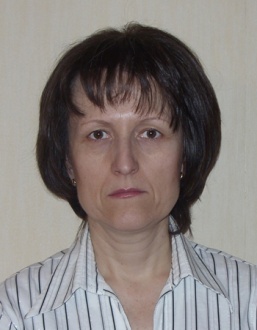
Senior Assist. Rumiana Staykova Nenova MD
This email address is being protected from spambots. You need JavaScript enabled to view it.
Laboratory staff:
Senior Assist. Iskra Angelova Tomova, MD, PhD
e-mail: This email address is being protected from spambots. You need JavaScript enabled to view it.
Lilia Goryanava, biologist, Expert in Microbiology
Gatanka Rizova, laboratory assistant
Antoaneta Radeva, laboratory assistant
Emilia Pancheva, laboratory worker
Activites:
NRL SBP is the only civilian laboratory in the country for testing of suspected bioterrorism (BT) samples. It performs highly specialized, primary and reference tesing of clinical samples for anthrax, brucellosis, tularemia, plague, cholera and Legionnaires' disease, as well as water samples for Legionella spp and Francisella spp.
The laboratory experts have been trained in Reference centers in Germany, Unaided Kingdom and Spain.
NRL SBP is accredited according to БДС EN ISO / IEC 17025: 2005.
The modern equipment and the qualified personnel provide high quality of diagnosis and research activities for highly pathogenic zoonotic agents (B anthracis, Brucella spp, F tularensis, Y pestis, B mallei, B pseudomallei), as well as for V cholerae, and Legionella spp
The laboratory participates in EU projects funded by: Executive Agency for Health and Consumers (EAHC), European Center for Disease Control and Prevention (ECDC) and others (EQADeBa; QUANDHIP; EMERGE, SHARP, TERROR, etc.
NRL SBP conducts annually:
- Microbiome analysis and bioinformatics with international participation
- Microbiological diagnosis of highly pathogenic bacterial infections
- Legionella, Legionnaires disease and other legionnaires - current state of the problem
The laboratory experts provide assistance to all regional laboratories in solving different diagnostic problems, incl emerging and re-emerging bacterial zoonoses, in the country.
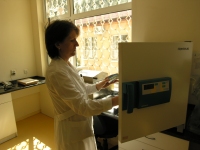 |
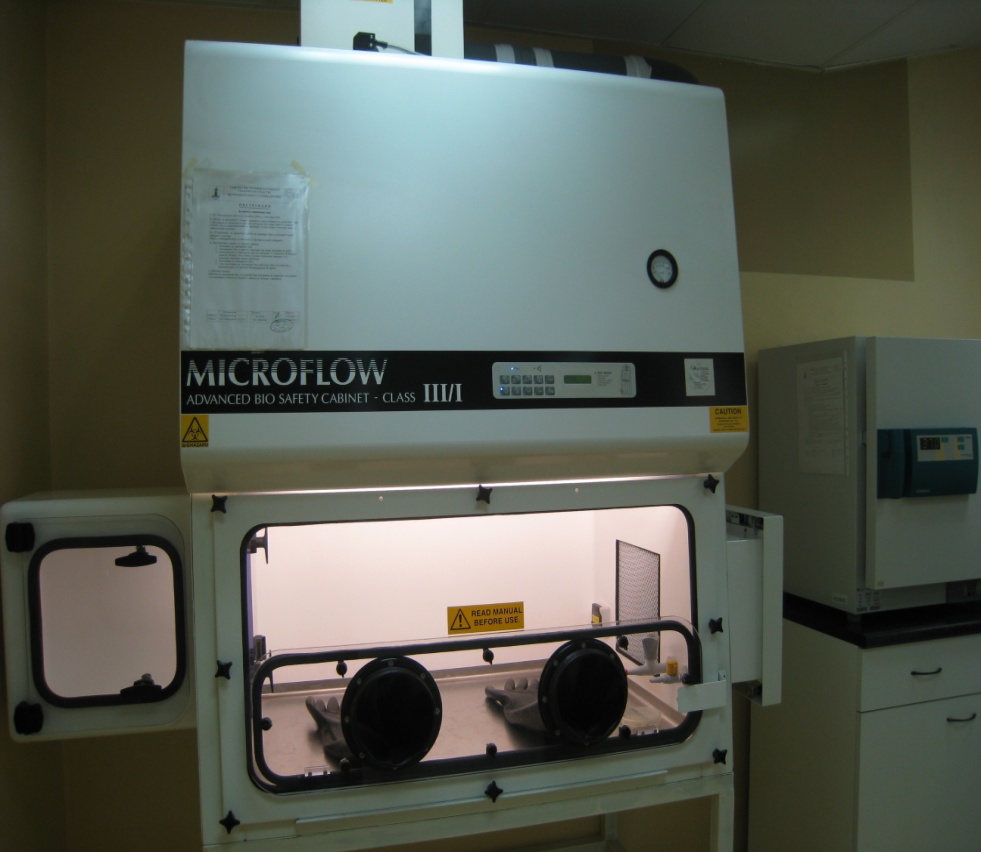 |
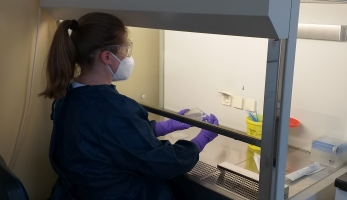 |
Section "Microbiom"

Head of the sector - Prof. Stefan Panaiotov, PhD
email:This email address is being protected from spambots. You need JavaScript enabled to view it.
Staff:
Vladimir Tolchkov - Senior Assistant - This email address is being protected from spambots. You need JavaScript enabled to view it.
Yordan Hodzhev - PhD student - This email address is being protected from spambots. You need JavaScript enabled to view it.
Borislava Tsafarova - PhD student - This email address is being protected from spambots. You need JavaScript enabled to view it.
Tatiana Stoicheva - laboratory worker
Written by Super User
NRL of Enteric infections, pathogenic cocci and diphtheria
Head: Dr. Antoaneta Decheva, Ph.D.
tel. +359 2 9446 999 / 265;
е-mail: This email address is being protected from spambots. You need JavaScript enabled to view it.
Composition of the laboratory:
- Chief Assist. Maria Radoslavova Pavlova - Biologist, Doctor of Microbiology
e-mail: This email address is being protected from spambots. You need JavaScript enabled to view it. - tel. +359 2 9446 999 / 268
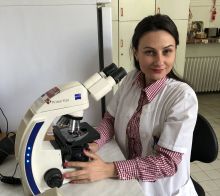
- Lilia Todorova – lab worker

- Daniela Spasova - lab worker
History of the laboratory
In 1950 a laboratory for Shigella was funded in NCIPD, headed by Dr Trifonova. In 1961 a laboratory for E. coli was funded, headed by Dr Atanasova, also a laboratory for Salmonella, headed by Dr Koen. Their adherents were Dr Bratoeva, Dr Mladenova, Dr Mollov. The National Reference Laboratory for Enteric Infections was funded in 1993 and was headed by Dr Petar Petrov. In 2019 this laboratory was associated with the NRL for Pathogenic cocci and diphtheria.
The National Reference Laboratory of enteric infections, pathogenic cocci and diphtheria is accredited by BAS according to the standard BDS EN ISO / IEC 17025: 2006 of 31.10.2009.
Activities of the laboratory
Diagnostic work
Processing throat swabs, nasal swabs and feces for identification of pathogenic cocci, corynebacteria and enteric bacteria.
The laboratory performs serologic investigation of serum samples for typhoid fever.
Reference work
Confirmative identification of isolates which are sent to the laboratory from other microbiological labs: pathogenic cocci, corynebacteria and enteric bacteria.
Education
Each year the laboratory performs courses on:
Enteric infections;
Streptococcal infections and diphtheria;
Staphylococcal infections.
Science
The laboratory participates in national and international scientific projects.
- FWD AMR – RefLabCap for AMR Testing in Salmonella and Campylobacter, funded by The Consumers, Health, Agriculture and Food Executive Agency, Directorate-General for Health and Food Safety, ECDC, Statens Serum Institute and the Technical University of Denmark.
- GRAM (Global Research on Antimicrobial Resistance). University of Oxford and Institute for Health Metrics and Evaluation (IHME), Washington.
Publications for 2018-2022
- Peterson, M.E.a, Li, Y.a, Bita, A.b, Moureau, A.c, Nair, H.a,d, Kyaw, M.H.e, Abad, R.f, Bailey, F.g, Garcia, I.F.h, Decheva, A.i, Krizova, P.j, Melillo, T.k, Skoczynska, A.l, Vladimirova, N.i Meningococcal serogroups and surveillance: A systematic review and survey. Journal of Global Health Open AccessVolume 9, Issue 1, 2019, Article number 010409. IF 4.195 Q1
- Florens Lohrmann, Markus Hufnagel, Mirjam Kunze, Baharak Afshar, Roberta Creti, Antoaneta Detcheva, Jana Kozakova, Javier Rodriguez-Granger, Uffe B. Skov Sørensen, Immaculada Margarit, Domenico Maione, Daniela Rinaudo, Graziella Orefici, John Telford, Manuel de la Rosa Fraile, Mogens Kilian, Androulla Efstratiou, Reinhard Berner & Pierrette Melin for the DEVANI Study Group. Neonatal invasive disease caused by Streptococcus agalactiae in Europe: the DEVANI multi-center study. Infection, December 2022. Infection https://doi.org/10.1007/s15010-022-01965-x. IF 5.284 Q1
- Study on patients with Clostridioides difficile infection during the COVID-19 pandemic in BulgariaValeri. Veleva, Maria Pavlova, Ekaterina Alexandrova, Мetodi Popov, Ivan Lutakov, Tatiana Tcherveniakova, Andreana Angelova, Eli Hristozova, Yordan Kalchev and Ivan Ivanov. Biotechnology & Biotechnological equipment 2023, Vol. 37, no. 1, 188–193 – Q3
- CAMPYLOBACTER INFECTION IN CHILDREN AND ADULTS IN BULGARIA: COMPARATIVE CHARACTERISTICS AND ANTIMICROBIAL RESISTANCE. Velev, V., Pavlova, M., Alexandrova, E., Ivanov, I., Popov, M. Biotechnology and Biotechnological Equipment, 2022, 36(1), pp. 292–298 – Q3; IF= 1.762
- RECURRENT MENINGITIS CAUSED BY SALMONELLA ENTERICA PARATYPHI B VAR. JAVA IN 3-MONTH-OLD INFANT. M. Pavlova, G. T. Lazarova, E. Aleksandrova, V. Velev, S. Isencik, P. Georgieva, M. A. Mitev. Paediatrics and international child health. 2022. DOI: 10.1080/20469047.2023.2168428 – Q3; IF= 2.73
- PREVALENCE OF DIARRHEAGENIC E. COLI AMONG HOSPITALIZED CHILDREN IN A CLINICAL CENTRE. V. Velev, M. Pavlova, E. Alexandrova, M. Popov, I. R. Ivanov. Acta Medica. Vol. XLVIII, 2021, №4, 5-8. DOI: 10.2478/AMB-2021-004 - Q4
- A STUDY OF PARATYPHOID FEVER IN BULGARIAN CHILDREN Pavlova, M., Alexandrova, E., Kalchev, Y., ...Murdjeva, M., Kantardjiev, T. Acta Medica Bulgarica, 2021, 48(1), pp. 59–62 - Q4
- ULTRASOUND CHANGES AS A MARKER FOR EARLY DIAGNOSIS OF HEPATITIS A IN CHILDHOOD.Velev, V., Popov, M., Velcheva, D., Pavlova, M. General Medicine, 2021, 23(6), pp. 50–53 - Q4
- VIRAL GASTROENTERITIS IN CHILDREN – CLINICAL AND MOLECULAR-EPIDEMIOLOGICAL FEATURES Velev, V., Popov, M., Stoyanova, A., ...Tcherveniakova, T., Nikolaeva-Glomb, L. General Medicine, 2021, 23(4), pp. 32–37 - Q4
- A CASE OF FASCIOLOSIS IN A 11-YEAR-OLD SYRIAN IMMIGRANT BOY Velev, V., Vutova, K., Pavlova, M., Mangarov, I. Journal of Tropical Pediatrics, 2020, 66(2), pp. 226–227 – Q2; IF = 1.794
- SHIGELLOSIS IN CHILDREN-CLINICAL COURSE AND ANTIMICROBIAL SENSITIVITY Pavlova, M., Popov, M., Alexandrova, E., Velev, V. General Medicine, 2020, 22(6), pp. 33–36 – Q4
- CAMPYLOBACTER INFECTIONS AMONG BULGARIAN CHILDREN: MOLECULAR CHARACTERIZATION AND ANTIMICROBIAL SUSCEPTIBILITY Pavlova, M., Alexandrova, E., Donkov, G., ...Kantardjiev, T., Velev, V. Biotechnology and Biotechnological Equipment, 2020, 34(1), pp. 1038–1042 – Q3 IF= 1.632
- COVID-19 AND GASTROINTESTINAL INJURY: A BRIEF SYSTEMATIC REVIEW AND DATA FROM BULGARIA. Velev, V., Popov, M., Velikov, P., ...Tcherveniakova, T., Pavlova, M. Infezioni in Medicina, 2020, 28, pp. 37–41 – Q3
- TONGUE INFECTION CAUSED BY DIROFILARIA REPENS Velev, V., Popov, M., Pavlova, M., Karageorgiev, M., Mangarov, A. QJM, 2019, 112(8), pp. 619–620 – Q2;
- ADVANTAGES OF EVA GREEN REAL-TIME MPCR WITH CULTURE AND IMMUNOCHROMATO-GRAPHIC METHODS FOR DIFFERENTIATING C. JEJUNI / COLI DIRECTLY FROM FECES Pavlova, M., Velev, V., Dobreva, E., ...Tomova, I., Kantardjiev, T. Acta Medica Mediterranea, 2018, 34(4), pp. 1027–1030 – Q3; IF= 0.147
- INVESTIGATION OF SALMONELLA ENTERITIDIS OUTBREAK IN FOUR KINDERGARTENS Pavlova, M., Velev, V., Karageorgiev, M., ...Mangarov, A., Kantardjiev, T. Infezioni in Medicina, 2018, 26(4), pp. 316–320 -Q2
- DIAGNOSTICS AND THERAPEUTIC BEHAVIOUR IN PATIENTS WITH CAMPYLOBACTERIOSIS Velev, V., Pavlova, M., Mangarov, A., ...Tomov, T., Vutova, K. Comptes Rendus de L'Academie Bulgare des Sciences, 2018, 71(3), pp. 417–423 – Q2; IF= 0.326
International quality assurance
INSTAND, Düsseldorf, Germany
WHO Collaborating Centre for Antimicrobial Resistance in Foodborne Pathogens and Community Reference Laboratory – Antimicrobial Resistance, CRL-AR, Copenhagen, Denmark
External quality assay for Bulgaria
The laboratory organizes and performs twice per year quality assurance for the microbiological laboratories in Bulgaria:
Written by Super User
NRL of Mycology
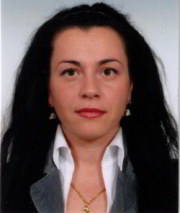
Zav. Laboratory
Dr. Lyubomira Angelova Boyanova
e-mail: This email address is being protected from spambots. You need JavaScript enabled to view it.
Tel. 359/ 2 944 69 99 / ext. 318, 319 /
Composition of the laboratory:
- Zoya Vasileva Ivanova, master - biologist, microbiologist
e-mail: This email address is being protected from spambots. You need JavaScript enabled to view it. - Lilyana Petrova Lozanova, St. medical laboratory assistant
- Lyubka Dimitrova Kovacheva, Midwife
History of the laboratory
It was founded in 1988 by Prof. Dr. Todor Kantarjiev, and from 1991 to 1993 it was united with the laboratory of OOI of the National Institute of Health Sciences. The main task of the laboratory is the organization of an inter-laboratory network of microbiological laboratories in the country for the diagnosis of skin-mucosal and systemic mycoses with regard to public health. Cutaneous-mucous mycoses are the most common chronic infections among the population, and systemic mycoses are the most common complications in patients with immune deficiency, as well as nosocomial infections.
The laboratory was designated as a National Reference Laboratory for Mycology in 2001 by order of the Ministry of Health. Since 2002, the laboratory has participated in the international quality control system, and is certified by INSTAND , Dusseldorf, Germany. Since the same year, 2002, the laboratory has been conducting external quality control for the country for laboratory diagnosis of skin-mucous mycoses and invasive fungal infections, and since 2013, for serological diagnosis of syphilis. In 2002, the laboratory was accredited according to BDS/ISO 17 025, as the Mycology Sector of the LIC of the National Institute of Health, and is the only medical laboratory in our country with accreditation according to BDS 17 025.
Research conducted in the laboratory
Mikozi Laboratory Activity Plan in 2024
Active medical and diagnostic, research and educational activities are carried out at the NRL Mikosi, as well as educational activities with postgraduate training courses for specialists and students on the topics: "Modern etiological diagnostics and etiotropic therapy of infections in immunocompromised patients" and "Etiological diagnosis and etiotropic therapy of invasive and cutaneous mycotic infections"
An active research activity is carried out at NRL Mikosi, with the most significant scientific topics in recent years being
The results of the scientific activity of the laboratory during the last five years are presented in the following publications in international and national refereed journals:
1. Boyanova - Molecular and microbiological approaches for rapid etiological diagnosis of systemic mycoses – Problems of Inf. Diseases-2022, N3, vol. 49, 35-42. 2022. Q4
2. Боянова Л - РНК – ваксините – подходи от реалната практика при определени групи пазциенти – Covid -19 през 2020-2021, ред. профИ. Христова и доц.Н.Янчева, 2022, 395-402
3. Kohlenberg A, Monnet DL, Plachouras D. Increasing number of cases and outbreaks caused by Candida auris in the EU / EEA, 2020 to 2021. Eurosurveillance. 2022;27(46):1–6. IF 21.286
4. Philipova I, Levterova V, Simeonovski I, Ivanova Z, Boyanova L, Kantardjiev T. Prevalence of Neisseria gonorrhoeae and Mycoplasma genitalium in Bulgarian population of reproductive age from Sofia Municipality, 2018-2019. PROBLEMS of Infectious and Parasitic Diseases. 2021 Aug 27;49(2):20-6. Q4
5. Malcheva M, Philipova I, Simeonovski I, Levterova V, Brankova N, Kantardjiev T. ANTIMICROBIAL SUSCEPTIBILITY OF S. PNEUMONIAE STRAINS ISOLATED FROM CHILDREN WITH NASOPHARYNGEAL CARRIAGE. PROBLEMS of Infectious and Parasitic Diseases. 2020 May 12;48(1):15-20. Q4
6. Plachouras D, Lötsch F, Kohlenberg A, Monnet DL, Candida auris Survey Collaborative Group. Candida auris: epidemiological situation, laboratory capacity and preparedness in the European Union and European Economic Area*, January 2018 to May 2019. Eurosurveillance. 2020 Mar 26;25(12):2000240. IF 6.307
7. Kohlenberg A, Struelens MJ, Monnet DL, Plachouras D, Candida Auris Survey Collaborative Group. Candida auris: epidemiological situation, laboratory capacity and preparedness in European Union and European Economic Area countries, 2013 to 2017. Eurosurveillance. 2018 Mar 29;23(13):18-00136. IF 7.421
8. Боянова Л- Клиничен случай на Tinea capitis дерматофитоза при дете, сп. Педиатрия, бр.3/ 2020, 2-3;
9. Boyanova L, Ivanova Z- Clinical case of Cryptococcal meningitis in a liver transplant patient, Problems of Inf.Diseases, vol.49, N 1, 2021,37-40
10. Ivanova, I. Philipova, L. Boyanova, T. Kantardjiev - Retrospective re-identification of Candida strains by MALDI-TOF in seek of Candida auris PROBLEMS of Infectious and Parasitic Diseases. 2022. Q4
Written by Super User
Department of Microbiology

Assoc. Prof. Viktoriya Levterova, PhD
tel. +359 2 944 69 99 / ext. 290 /
e-mail: This email address is being protected from spambots. You need JavaScript enabled to view it.
Written by Super User
 English
English
 Bulgarian
Bulgarian 


